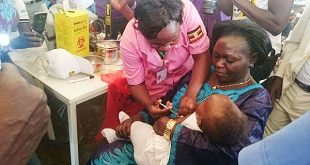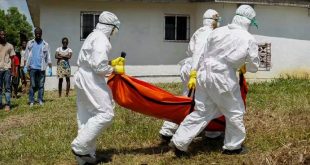
Countries need to put more resources in vaccine preventable disease surveillance
| NELSON MANDELA OGEMA | Vaccine-preventable diseases such as polio could make a devastating recurrence in Africa due to weak and cash strapped surveillance, a WHO expert says.
This could cost Africa US$ 22.4 billion and more than 915,000 deaths, thus reversing gains made in the fight, control and eradication [so far], says Richard Mihigo, programme manager for immunisation for vaccine development, WHO Regional Office-Africa.
The WHO has, therefore, developed Investment Case for Vaccine-Preventable Disease Surveillance in the African Region, 2020-2030, aimed at increasing domestic investment in surveillance from countries.
About US$470 million in operating costs will be needed over the next decade to realise this ambition, and this could save over 700,000 lives, prevent 20 million people from falling ill due to vaccine-preventable diseases, says WHO.
Vaccine-preventable disease surveillance, the systematic collection, analysis, interpretation, and dissemination of information regarding the occurrence of diseases in defined populations for public health action, is part of close observation focusing on diseases that can be prevented or controlled by vaccines, Mihigo explains.
Mihigo told SciDev.Net in an interview on 2 December that surveillance for diseases targeted by various vaccines in the Africa region have been mainly funded from the polio resources provided through the Global Polio Eradication Initiative.
“However, as [the] eradication of polio draws to a close, this funding has decreased substantially and will continue to decrease further in the coming years. In the African region, disease surveillance has mainly been funded through external resources and donor funding,” he says.
Vaccine-preventable diseases surveillance have declined markedly over the past two years, according to WHO.
“There are disease surveillance gaps in many countries and already, we are seeing large outbreaks of yellow fever in Angola and the Democratic Republic of Congo that also faces severe measles cases, meningitis in the meningitis belt countries with Nigeria and Niger impacted, pneumococcal meningitis and pneumonia in Burkina Faso and Ghana and Ebola virus disease in west Africa in Guinea, Liberia, Sierra Leone and ongoing outbreak in DRC,” he says.
“Disease surveillance and laboratory performance gaps usually results in delayed detection and response to disease outbreaks – leading to humanitarian crisis, loss of lives and disruption of economic activities,” he tells SciDev.Net.
The investment case will help African member states to realise the importance of investing in disease surveillance systems and step up accordingly with support from donors, according to Mihigo.
“We are hopeful that this initiative will make a strong case for vaccine-preventable diseases surveillance that will lead to increased funding from African governments but also for other non-traditional donors,” he says.
Mihigo explains that there are about 22 vaccine preventable diseases, but surveillance has not been prioritised with governments only giving support in human resource surveillance.
“Until recently there has been lack of appreciation of the economic impact of disease outbreaks, role of surveillance in measuring disease control and elimination targets,” he says.
Strengthening surveillance in countries considered hot spots for disease epidemics in Africa will help in early detection and timely response to outbreaks before they spread.
Pauline Bakibinga, associate research scientist, Health and Systems for Health Research Unit at African Population Health Research Center, says that the WHO investment case for vaccine preventable diseases has come late given that a number of deaths has occurred in the continent as a result of inadequate investments in disease surveillance.
“Perhaps now, countries and development partners can pay more attention to allocating more resources to disease surveillance,” she says.
Bakibinga adds that African governments need to adopt better management practices and resource allocation with good policies to strengthen health systems to avert disease outbreaks, which happen as a result of weak surveillance.
****
 The Independent Uganda: You get the Truth we Pay the Price
The Independent Uganda: You get the Truth we Pay the Price


